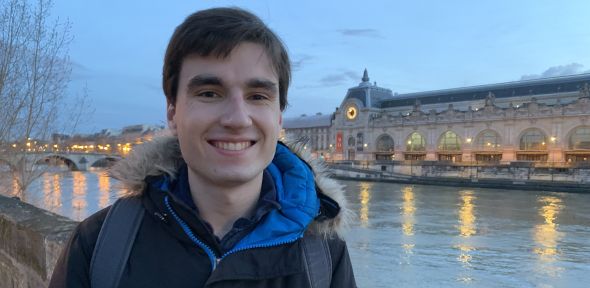
Faculty of Modern and Medieval Languages and Linguistics Raised Faculty Building University of Cambridge Sidgwick Avenue Cambridge CB3 9DA United Kingdom
Matthew's PhD research project is entitled "Outcasts of the Civil War: Exile and Identity in the Narratives of Max Aub, Michel del Castillo, and Mercè Rodoreda."
Matthew has been interested in the Spanish Civil War since the age of fifteen, when he undertook an exchange in Catalonia, during which his exchange partner gave him a copy of the unpublished account of his great aunt, who wrote of her experiences of living as a nine year-old child in a small village during the Civil War. During his undergraduate degree in Spanish and French at Cambridge (First Class Honours), Matthew developed his knowledge of literature about the Civil War and its aftermath, and he focused on nineteenth- and twentieth century writing from Spain, in addition to working on the French Enlightenment and contemporary Francophone literature. For his Erasmus year, Matthew studied at the University of Seville and at the Ecole Normale Supérieure (ENS) in Paris.
Matthew’s MPhil in European and Latin American Comparative Literatures and Cultures (Distinction, 2023) included a dissertation examining the political potential of intertextuality in Eduardo Mendoza’s novel La ciudad de los prodigios. In between his MPhil and starting his PhD, Matthew was a lecteur at the ENS in Paris, where he developed and taught five courses including one on the literature of exile. As well as continuing to explore questions of memory and its representability in the Spanish Civil War, Matthew is keen to maintain his interest in Francophone literature, with a view to establishing connections between texts and developing a broader, multilingual perspective on historical and cultural phenomena.
In 2019-20, Matthew volunteered as a Language Ambassador as part of the Multilingualism: Empowering Individuals, Transforming Societies project mentoring secondary school students for their GCSE Spanish. Since 2021, Matthew has been involved as a judge and translator of poems in the ‘Mother Tongue Other Tongue’ project run by the “Routes into Languages” charity, in which school pupils in England submit poems written either in their home language (other than English) or in a modern foreign language that they learn at school. He has also volunteered with the Routes into Languages Spelling Bee and Translation Bee competitions, which look to encourage enthusiasm for languages at school.
Matthew is also a very keen classical guitarist, and enjoys playing works by Villa-Lobos, Albéniz and Tárrega.
Scholarships / prizes:
Gibson Spanish Scholarship, Faculty of Modern and Medieval Languages (2024)
Bateman Scholarship, Trinity Hall (2019, 2022 and 2023)
Peter Lawrence Prize, Trinity Hall (2022)
In 2025, Matthew will be teaching a seminar in SP4.
Despite nearly five decades of democracy, the legacy of the Spanish Civil War and the ensuing dictatorship under Franco is unresolved, as there is still no universal, unambiguous political condemnation of the regime, whilst attempts to redress injustices in the commemoration of the dictatorship’s victims are mired in legal challenges. Nevertheless, by subverting the constraints of normative reality, literature can play an important role in illustrating perspectives excluded from hegemonic history, thus complementing contemporary grassroots initiatives to recover historical memory. Matthew's PhD project explores how three authors –– Max Aub, Mercè Rodoreda and Michel del Castillo, who themselves experienced the conflict and exile in the postwar –– give voice to heterogeneous Republican memories in Spanish, Catalan and French under the Francoist repression. More specifically, by comparing a novel by each of Aub, Rodoreda and del Castillo, the project will consider how these authors’ works engage readers in the remembrance of forgotten histories of the Civil War, examining the value of these three novels not only in providing transnational perspectives of Spanish and Catalan Republican exiles but also in the light of contemporary refugee crises.


